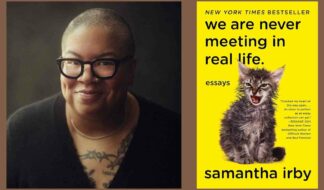"Dog Years"
Mark Doty
HarperCollins
Mark Doty's dogs kept him going. Even as he was losing his partner, Wally Roberts, to AIDS, the author's golden and black retrievers lit a little light that guided him through his darkest days.
"They demonstrated that eagerness to live at a point when I didn't feel so much of that eagerness myself," admits Doty, whose memoir "Dog Years" chronicles his journey with two pooches that were his rocks.
The acclaimed writer, best known for his award-winning poetry, needed the support of someone, or something, that would offer an open ear and wouldn't get tired of watching him weep as his partner passed in the mid-1990s.
"A dog will never tell you to get over it," he says. "Dogs never get tired of listening to you cry or carry on."
'Good medicine'
Doty, 53, began a few chapters five years ago, when Arden was old and needy, but the author couldn't distance himself enough from the retriever. He stalled.
"I didn't know what to do or how to proceed," he admits.
The author picked it back up after three years, re-imagining the story and mapping out a clearer picture of the tale he wanted to tell. He knew it couldn't just be an autobiography of him and his dogs. He had to say something that mattered to readers. But what?
"'Dog Years' is basically a book about love and time; about how we go on agreeing to participate in a world or to love a world that has endings in it."
It's a universal message that Doty wants all audiences to relish, especially anti-dog folks who haven't made the canine-companion transition.
"Millions upon millions of Americans live with dogs, and it's a place where we see so vividly how sexual orientation just does not make any difference in terms of that relationship," he says. "Dogs do not care at all."
During Doty's letting go phase, he could count on friends, but romping with the dogs on the beaches of Provincetown, Mass., for instance, was a different kind of esteem boost. Whereas interactions with animals are based on physical aspects, human connections fundamentally use dialogue. And when Doty didn't feel like talking, he could rely on an affectionate nudge from Arden or a slobbery lick from Beau.
"When you're in a kind of broken state, that's a real source of – I don't want to say healing – it feels like good medicine," he says.
They were also a positive distraction. Despite his partner's death, he still had to feed them regularly, take them for walks and let them outside to piddle. "When we're in a state of grief (it's a gift) to be with a creature who's truly capable of taking pleasure in life no matter what."
Festering feelings
After Wally passed, Doty's writing changed.
"It's important for me to cut to the chase and write with a sense of today," he says, noting his partner was only in his early 40s when he died.
The resulting memoir, "Heavenly Coast," heartbreakingly chronicles his illness and death. In Doty's second book, "Firebird," he recalls his deeply troubled childhood and life in the narrow-minded South.
As a college freshman in the '70s, Doty had yet to meet a self-identified gay person. He didn't have any gay teachers or exposure to blatantly queer television or movie personas. "I didn't have the sense that there was a life out there for me to join," he admits, noting much of his teenage writing was teeming with anxiety.
Following a suicide attempt, Doty, lost and resistant to saying no, accepted a woman's marriage proposal at 18. "Getting married was in part a desperate act of a kid who was just in flight from his sexuality and didn't know what to do with it," he admits.
It only made it worse that his mother, a chronic alcoholic, tried to shoot him. After his father told him what happened when Doty was older, the repressed incident returned to him in pieces. But it still remains an incomplete patchwork.
"One of the ways that kids get by in difficult situations that they can't do anything about is to sort of shut their awareness down, and I think that I was doing that," Doty says before continuing with a laugh. "And I probably also smoked a fair amount of marijuana, which didn't help my memory any."










